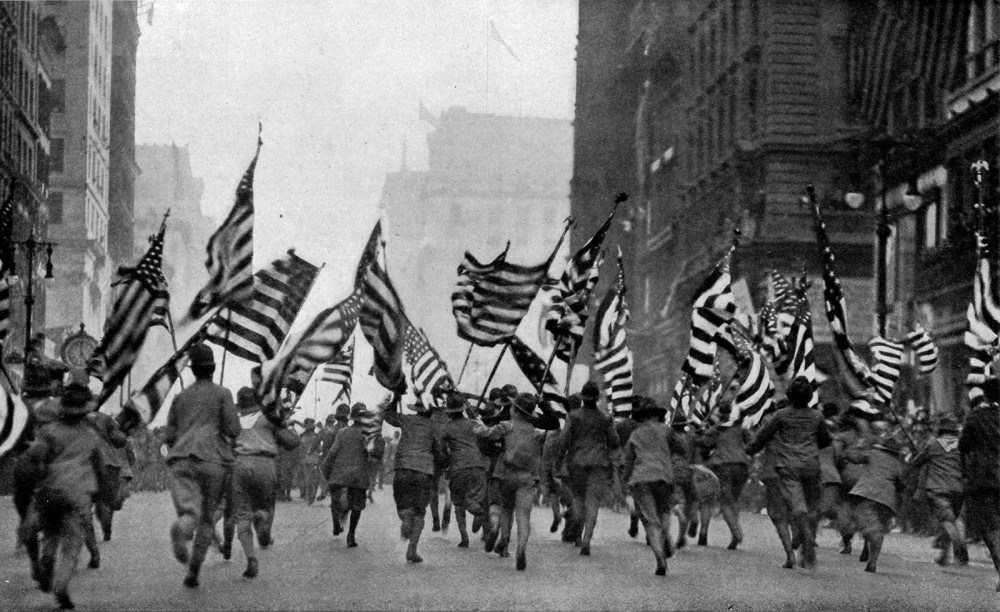Module 6 Reflection: World War I (WWI)
America Enters the WarPresident Wilson assumed that if Germany won the war, there would be an alter in power so drastic that it would be detrimental to Europe. On April 4, 1917 war was declared on Germany. The United States military was unprepared for what was to come next. During that time the U.S. didn't maintain armed forces or trained reserves during "peacetime." The U.S. relied on volunteerism in order to fill the ranks, but this option was not meeting the status quo.  |
| The Boy Scouts of America charge up Fifth Avenue in New York City in a “Wake Up, America” parade to support recruitment efforts. Nearly sixty thousand people attended this single parade. |
On May 18, 1917, Congress approved the Selective Service Act, President Wilson signed it within a week. The Selective Service Act originally stated that men from the age of 21-30 must register for military service. Around 2.5 million men were examined for the military service. The Army Medical Department found 1,533,937 physical defects (often more than one per individual). 34% of the men examined were either rejected or later discharged for these defects.
Many soldiers were rejected or discharged for psychiatric, neurological, or mental deficiencies. The president of the American Psychological Association developed multiple test to determine intelligence. Those who could read took the Army Alpha Test while the "illiterates" and non-english speaking immigrants took the nonverbal test known as the Army Beta Test. It was later found that the results misrepresented the levels of education for the recruits.
Wartime service allowed for collaboration between different social horizons. In the years 1917 and 1918, the U.S. army accepted immigrants and some were segregated. Black leaders saw the service as an opportunity to show that black men were able to assume the responsibilities of any citizen. Black leaders believed that if white soldiers saw them sacrificing and dying amongst them, then they would see that black soldiers deserved full citizenship. However, the War Department would not allow black troops to fight in combat. Instead, black troops were relegated to segregated service units where they worked as general laborers.
Bibliography:
Chapters, All, and All Chapters. THE AMERICAN YAWP, 7 June 2013, www.americanyawp.com/text/21-world-war-i/.

I enjoyed reading your reflection. It was very informative, I also done the same topic upon my reflection and we had a lot of things in common that I also talked about in my reflection. But, it was also things in yours that I didn't know of and learn a lot from it.
ReplyDeleteI can say this was a good reflection. It’s crazy the war department would not allow black troops to fight in combat.
ReplyDeleteHello Jordon, this was a fascinating reflection about the near beginning of the first World War. It was interesting that America originally had cold feet when it came to this war, especially since they were at the crossfire between all of it. It would have added to your post if you had included reasons why we were opposed to entering the war. I do agree with your assessment of how crazy it was that the war department would not allow black troops to fight in combat. I think that we could have made significant contributions to the War.
ReplyDeleteHey! I think it’s crazy how America has treated black men. They seem to always been disposable to the the US but they denied them the rights of wanting to join war. I feel like this s a hindering factor because they could’ve contributed to the war and lended a hand. But simply for their skin color they were denied entry, but now make up a plethora of men that now go to war.
ReplyDelete